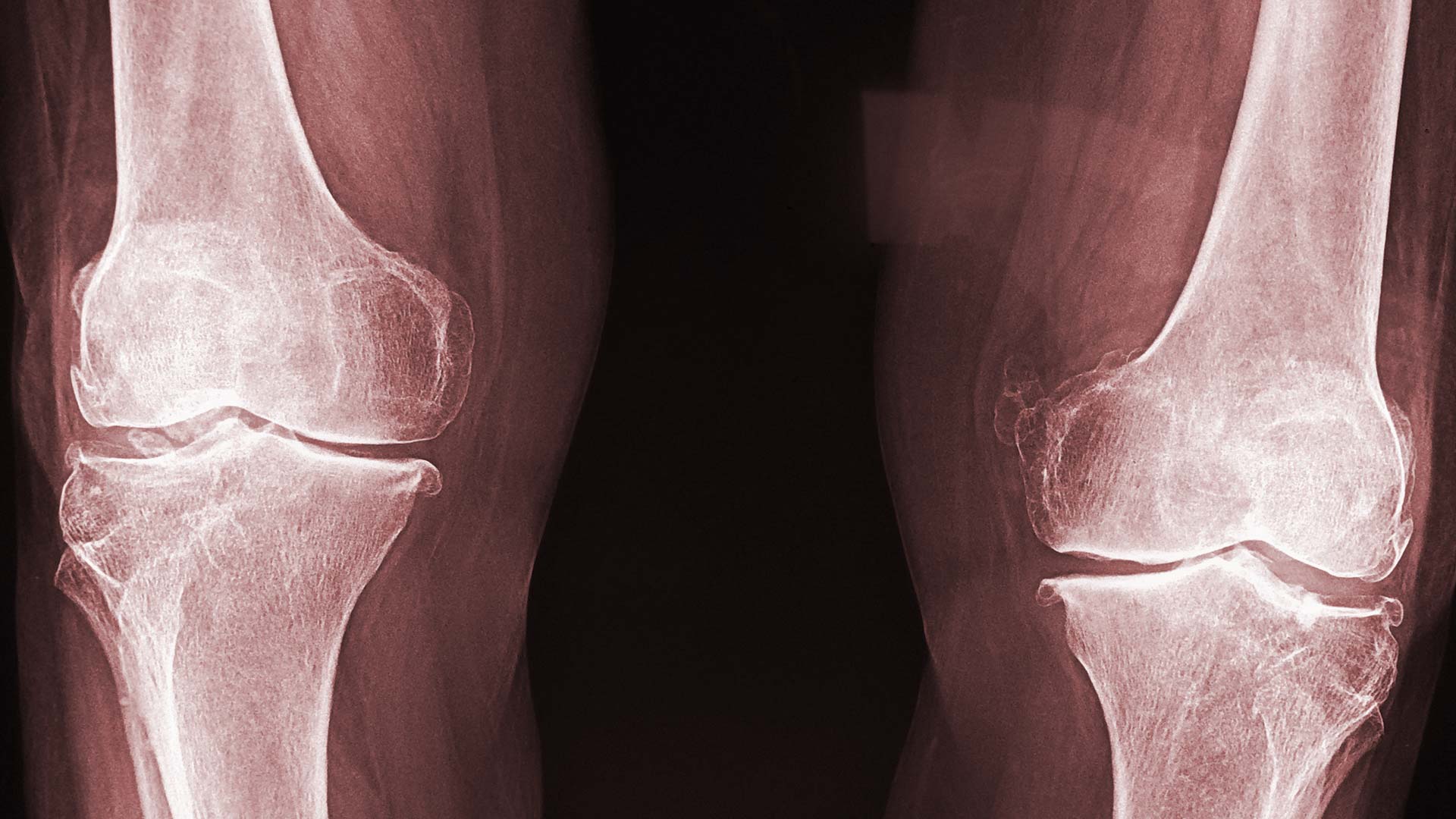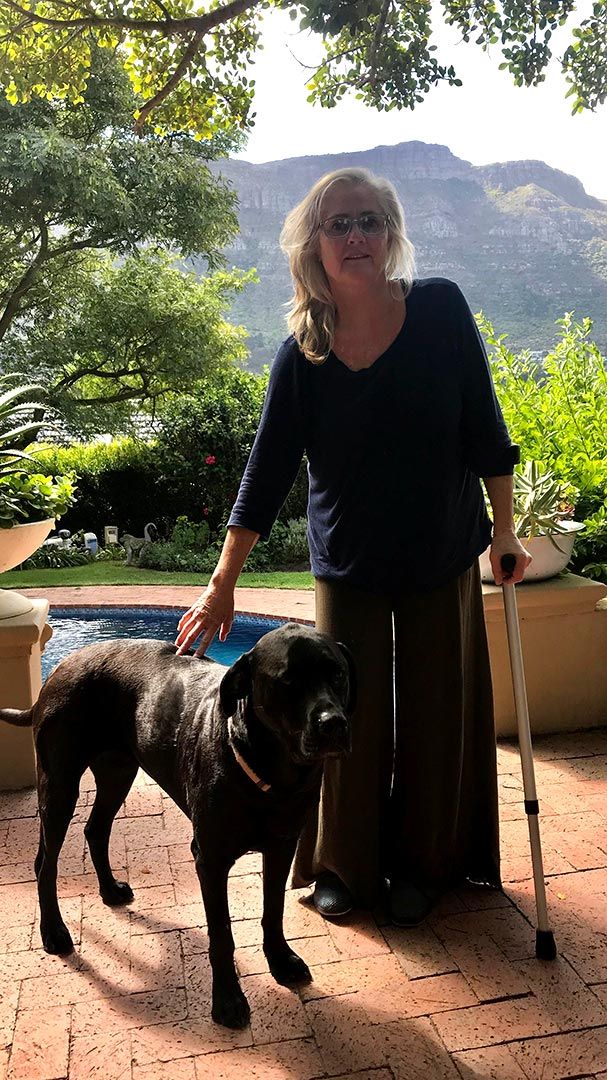A clinical psychologist is looking forward to resuming the activities she used to enjoy, after recently becoming the first patient at Netcare Christiaan Barnard Memorial Hospital to undergo a knee replacement aided by advanced navigation technology, using a technique that is a first for South Africa. Coincidentally, one of the patient’s dogs, a bullmastiff named Franki, also had knee replacement surgery not long ago and they have a goal in mind to celebrate their recovery.
“What I am really looking forward to once I am fully recovered is the freedom of going for walks in the forest with my dogs and dancing at a party, once the COVID-19 situation permits of course,” said Lesley Nortje, 62, only three days after her total knee replacement procedure.
“Mrs Nortje’s operation was scheduled three times before, however it had to be delayed each time because there were peaks in COVID-19 infection rates. At last, we were able to do her knee replacement. The delay meant that it could be performed with the aid of this recently commissioned, technologically advanced system,” says orthopaedic surgeon Dr Richard von Bormann, who performed the landmark procedure at Netcare Christiaan Barnard Memorial Hospital in the Cape Town City Bowl.
Balance and comfort
“Our ultimate aim in total knee arthroplasty, or knee replacement surgery, is to recreate a comfortable, balanced joint with stability and a good range of movement. The more accurately we can recreate the patient’s natural anatomy with the prosthetic knee joint in place, the better the knee will function and the better the patient’s comfort will be.”
Dr Von Bormann has undergone special training in the use of the Smith and Nephew’s handheld Navio Robotic Navigation system, which offers additional safeguards at each stage in the operation is planned intra operatively on a three-dimensional (3D) patient-specific map.
“In theatre, the surgeon traces the patient’s knee anatomy and measures the tensions of the ligaments with a mapping tool, which feeds highly detailed information into the system’s computer as a plan for the procedure. A surgical burr technique or a-resection guide is then fitted with fixed navigational reference points, which track movement of the anatomy in real time to enhance surgical accuracy,” Dr Von Bormann explains.
Additional safeguard technique a first for SA
Dr Von Bormann devised a technique whereby he combined this Brainlab Knee Navigation Platform from the CORI Robotic System with the additional safeguard of a Visionaire patient-specific cutting guide as a tool to confirm the accuracy of the Brainlab surgical plan. The manufacturers confirmed that the novel, combined use of the technology was a first for South Africa.
Triple-check technology
“Throughout the procedure, the computer triple checks in real time what the surgeon is doing against the 3D computer-generated map. Instead of relying solely on a pre-surgery MRI scan to design and manufacture patient specific cutting guides for total knee replacement procedures, the computer navigation system provides constant, highly detailed feedback,” Dr Von Bormann says.
While the computer navigation system allows for the surgical plan to be adjusted at the surgeon’s discretion, it automatically confirms the position and accuracy of the bony resections being performed so the surgeon’s designed plan is achieved. A verification tool confirms the accuracy of each resected cut as an additional check, so that the surgeon can make fine adjustments, if needed, before moving on to the next step of the procedure.
“This is especially helpful in knee replacement surgery because the prosthetic knee joint must match the patients anatomy to fit into the space created when the damaged bone surface is removed. The more accurately this can be achieved, the less need there is a need to adjust the ligaments surrounding the joint.”
The computer navigation system helps to ensure the tension of the ligaments is recreated to provide the person’s natural balance in their new prosthetic knee’s function. If the ligaments are too tight their range of motion would be restricted, and the person would feel discomfort. If the ligaments are not tight enough, however, the knee could be unstable.
A holiday accident and years of discomfort
Mrs Nortje says that over the years she had injured her knee several times, most notably on a visit to Italy some 12 years ago. “To celebrate my 50th birthday I had planned a walking trip in Italy but soon after we arrived, I damaged some ligaments on my knee. It was quite painful, and so instead of a walking holiday we were ‘forced’ to make the most of our time there enjoying Italian cuisine and drinking in the beautiful scenery instead,” she recalls.
Over the years, her knee also deteriorated from osteoarthritis, compounding her discomfort. Initially more conservative treatments were prescribed, including physiotherapy and injections, but as the condition of her knee became more severe Mrs Nortje was no longer able to do the things she formerly loved.
“I have been struggling for years, and for the last few years I have not been able to walk my dogs in the forest or undertake any activities I previously enjoyed. I had not been looking forward to the prospect of a knee replacement, but it got to a point where I was in a lot of pain and it was compromising my quality of life.
“As a clinical psychologist, I was fortunate that my difficulty walking did not affect my ability to work, but it is a bit disheartening to always be in pain and to be compromising your lifestyle because of your knee. In the end it became an absolute necessity for me to have the total knee replacement.”














